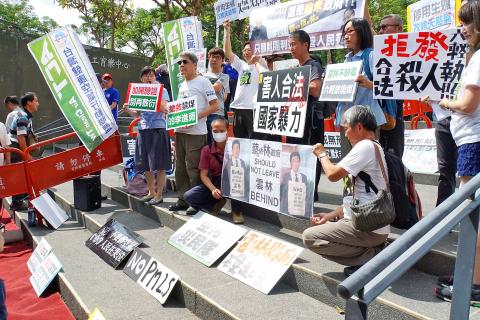People yesterday protested in Yunlin County’s Douliou City (斗六), calling on the county government not to extend permits for Formosa Petrochemical Corp’s (FPCC, 台塑石化) coal-fired power plants.
The Taiwan Healthy Air Action Alliance and other groups marched alongside Democratic Progressive Party Legislator Liu Chien-kuo (劉建國).
They called on the county government to not extend the validity of 12 permits, which expire today.

Photo: Chan Shih-hung, Taipei Times
They also said that the Presidential Office should establish a special committee to deal with air pollution as a national security issue.
Some protesters carried photographs of deceased relatives, saying that air pollution can lead to death.
On Friday, the Yunlin County Government and FPCC signed a memorandum of understanding (MOU) that said the firm would convert three of its coal-fired power generators into gas-fired facilities by 2025.
Alliance director Yeh Guang-peng (葉光芃) welcomed the move, but said the effectiveness of the MOU is questionable.
The MOU only includes the power plant in Mailiao Township (麥寮), which uses less than 40 percent of the coal used by FPCC’s naphtha cracker in the township, Yeh said in a news release.
The company does not need eight years to replace coal with natural gas, he said, adding that the company should use natural gas in all of its generators by 2020.
Yunlin Environmental Protection Bureau Director Lin Chang Chao (林長造) said the bureau has shortened the permits’ validity from five years to two years and has tightened its review of the application.
The county government’s review process is the strictest in the nation, Lin said, adding that the county could not fight on its own and needs the support of the central government.
Meanwhile, the alliance lamented the death of director Chi Po-lin (齊柏林), who died in a helicopter crash in Hualien yesterday.
It commemorated his efforts to document changes to the nation’s environment.

Right-wing political scientist Laura Fernandez on Sunday won Costa Rica’s presidential election by a landslide, after promising to crack down on rising violence linked to the cocaine trade. Fernandez’s nearest rival, economist Alvaro Ramos, conceded defeat as results showed the ruling party far exceeding the threshold of 40 percent needed to avoid a runoff. With 94 percent of polling stations counted, the political heir of outgoing Costa Rican President Rodrigo Chaves had captured 48.3 percent of the vote compared with Ramos’ 33.4 percent, the Supreme Electoral Tribunal said. As soon as the first results were announced, members of Fernandez’s Sovereign People’s Party

MORE RESPONSIBILITY: Draftees would be expected to fight alongside professional soldiers, likely requiring the transformation of some training brigades into combat units The armed forces are to start incorporating new conscripts into combined arms brigades this year to enhance combat readiness, the Executive Yuan’s latest policy report said. The new policy would affect Taiwanese men entering the military for their compulsory service, which was extended to one year under reforms by then-president Tsai Ing-wen (蔡英文) in 2022. The conscripts would be trained to operate machine guns, uncrewed aerial vehicles, anti-tank guided missile launchers and Stinger air defense systems, the report said, adding that the basic training would be lengthened to eight weeks. After basic training, conscripts would be sorted into infantry battalions that would take

GROWING AMBITIONS: The scale and tempo of the operations show that the Strait has become the core theater for China to expand its security interests, the report said Chinese military aircraft incursions around Taiwan have surged nearly 15-fold over the past five years, according to a report released yesterday by the Democratic Progressive Party’s (DPP) Department of China Affairs. Sorties in the Taiwan Strait were previously irregular, totaling 380 in 2020, but have since evolved into routine operations, the report showed. “This demonstrates that the Taiwan Strait has become both the starting point and testing ground for Beijing’s expansionist ambitions,” it said. Driven by military expansionism, China is systematically pursuing actions aimed at altering the regional “status quo,” the department said, adding that Taiwan represents the most critical link in China’s

‘REALLY PROUD’: Nvidia would not be possible without Taiwan, Huang said, adding that TSMC would be increasing its capacity by 100 percent Nvidia Corp CEO Jensen Huang (黃仁勳) on Saturday praised and lightly cajoled his major Taiwanese suppliers to produce more to help power strong demand for artificial intelligence (AI), capping a visit to the country of his birth, where he has been mobbed by adoring fans at every step. Speaking at an impromptu press conference in the rain outside a Taipei restaurant, where he had hosted suppliers for a “trillion-dollar dinner,” named after the market capitalization of those firms attending, Huang said this would be another good year for business. “TSMC needs to work very hard this year because I need a lot